|
The Right Honourable Ben Wallace MP
formerly Scots Guards
Secretary of State for Defence
In conversation with The Editor
|
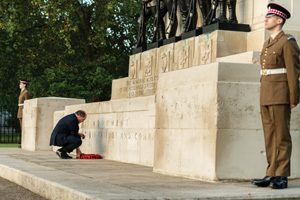 The Secretary of State for Defence laying a wreath at the Guards’ Memorial at 6am on VE Day, Friday 8th May 2020 The Secretary of State for Defence laying a wreath at the Guards’ Memorial at 6am on VE Day, Friday 8th May 2020 |
Very early on the morning of VE Day, Friday 8th May 2020, I was ready in my drawing room in Wiltshire, with iPad balanced in front of me, a mug of tea on the table, and wearing a tie for the first time in nearly two months. The Secretary of State for Defence, The Right Honourable Ben Wallace, MP, formerly Scots Guards, had agreed to give me an interview, it was 6.15am, and we were just about ready to start. The screen flickered and I was looking at the ceiling of the Major General’s office, then the floor, and then the ADC, Captain Orme Clarke, who came into view with a ‘good morning’ and a quick update. The Secretary of State and the Major General were now in the building, having a quick sandwich and some coffee following their wreath-laying at the Guards’ Memorial. Just time for me to get to the kitchen for a second cup of tea.
Then more activity in the Major General’s office, with the door to the corridor opening, the Brigade Major and the Garrison Sergeant Major appearing with another ‘good morning’, followed by a brief chat with the Major General who then introduced me to The Secretary of State. So here we were. Me sitting in Wiltshire, on a glorious early morning in May, and with a good view of the river in the distance; and The Secretary of State in the Major General’s office, looking down the narrow lens of an iPhone.
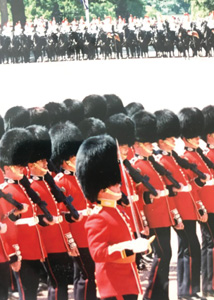 Captain Ben Wallace on the Queen’s Birthday Parade, 1996
Captain Ben Wallace on the Queen’s Birthday Parade, 1996
|
We began by talking about the 75th Anniversary of VE Day, a commemoration that in normal times would have had many national and local events during the course of the day, including parades, concerts, and street-parties. Now, in the midst of the Covid-19 lockdown, it would be a rather muted and measured occasion. With most of the events now cancelled, the essence of the day had now, in Ben Wallace’s words, been ‘distilled down to just two parts, the remembrance and the celebration….’. The first event in his programme on VE Day was to lay a wreath at the Guards’ Memorial, an act of remembrance which, as he says, is quite a personal thing. For example, remembering grandfathers who fought in the Second World War, or soldiers from one’s own regiment. So for a former Scots Guardsman, it seemed that to begin the day here, very early in the morning, alongside the Major General and other serving Guardsmen, was an appropriate place to start, something that set the tone for the remainder of the day.
Walking across Horse Guards, as a civilian in plain clothes, and not quite sure whether he should be marching in step with the Major General and the Garrison Sergeant Major, Ben Wallace recalled the last time he had been there: ‘The Irish Guards’ Queen’s Birthday Parade in 1996’. Twenty-four years later, he was here again. ‘6 o’clock in the morning. A very still park. The sun on the memorial. And a good way to remember, because so many of those who fought’ in the Second World War ‘never made it to VE Day’.
Recalling the early 1990s, I asked Ben Wallace to reflect on his decision to join the Army. At school, he remembers ‘a very old colonel, a Scotsman, who had been in the Royal Scots Greys, so a number of us found ourselves on the young officers’ course for the Royal Scots Dragoon Guards, whether we knew what that was or not’. From school he went on to the Regular Commissions Board and spent some time as a ski instructor in Alpbach before going to the Royal Military Academy Sandhurst where the options for his regimental choice broadened. Although his initial interest was in the Cavalry, partly because his father had served in the King’s Dragoon Guards in Malaya, later taking his young son on visits to Bovington, he now found himself enjoying the ‘infantry work’ that was the mainstay of officer cadet training at Sandhurst. Then there was another factor: the staff at Sandhurst, in the days when ‘all the college adjutants, nearly all the colour sergeants, and all the company sergeant majors were Guardsmen’, proved to be good recruiters for the Household Division.
Ben Wallace had friends joining the Guards, and as a Scotsman, the Scots Guards seemed a perfect choice. And since the Battalion was at the time an armoured infantry battalion, satisfying some of his interest in armoured soldiering, this all helped with his decision, although he might have preferred Edinburgh rather than Germany!
He was 20 when he was commissioned into the Scots Guards, and like most young officers of that age, he was not at all clear about his long-term plans. As he recalls, there was a rather less formal view about converting to regular commissions in those days, and career planning was perhaps less focused than it is now. While there was probably a stage when he had contemplated staying on, in the event he decided that the time to move on was around the age of 30, since the opportunities to command soldiers, the part he really enjoyed, were probably going to diminish thereafter.
One of the catalysts for moving on was Ben Wallace’s interests in politics, which went back to his time at school. He recalls that the 1980s for his generation was a formative period, and ‘quite exciting….. Margaret Thatcher, Michael Foot, the Cold War, the nuclear debate, the Falklands War, a very dynamic political time’, although he would probably agree that the period through which he is now living, as a politician, is no less dynamic, in fact probably more so since many of the norms of that previous era have disappeared.
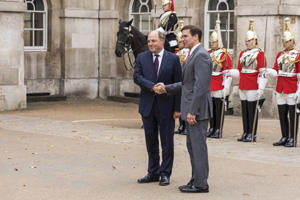 Ben Wallace meeting the United States Secretary of Defense Mark Esper at Horse Guards in September 2019 Ben Wallace meeting the United States Secretary of Defense Mark Esper at Horse Guards in September 2019
|
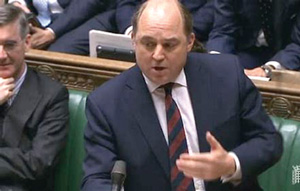 Ben Wallace in the House of Commons Ben Wallace in the House of Commons |
As Ben Wallace said to me in our conversation ‘you get the government you deserve if you don’t stand up for what you believe’. If one thinks that things are not right, as he did in the late 1990s, then ‘it’s worth having a go’, in his case, at being a politician. One of the issues that he felt strongly about then, something that drew him into active politics in the late Nineties, was his passionate belief in maintaining the Union and not losing Scotland in a future referendum; he wanted to be part of the debate and to contribute. He started looking for a possible seat in the Scottish Parliament, and then the chance came sooner than he expected, to represent North East Scotland in the 1999 election. He was elected and went on to serve in the Scottish Parliament for the next four years until 2003, when he moved to Lancashire and was selected as Conservative candidate to fight the marginal seat of Lancaster & Wyre. He won the seat at the General Election of 2005, and then the new seat of Wyre and Preston North in 2010, 2015, 2017, and 2019. His career in government began in 2010 when he was appointed as Ken Clarke’s Parliamentary Private Secretary. In 2014 he became Parliamentary Under-Secretary of State in the Northern Ireland Office, and in 2016 was appointed as Security Minister, and Defence Secretary three years later.
He sees many comparisons between politics and the Army. ‘It’s all about people… and if you don’t like people you should not be in politics…. and I learnt my politics in the Officers’ Mess ….. and about constituency work from being a platoon commander’. As a young officer ‘you can think you are the bee’s knees and then Guardsman Bloggs will tell you that he has a much more important problem than you have. And the constituency is the same. I can go from being Defence Secretary, talking to the US Defense Secretary on the telephone…… and then go to my constituency surgery where someone will not be the remotely interested’ …. because they will want to ask him about something that directly affects them. ‘It’s one of the greatest things about the British system….. and I believe you should live where you represent, which is why I live in North Lancashire….’
Managing one’s time and being organised is pretty important, something that soldiers learn early on in their military careers, a lesson that is equally applicable to politicians. Another quality from the Army that has followed Ben Wallace into politics is the importance of trusting one’s subordinates and avoiding the temptation to micro-manage, a factor that has been vital during this current Covid-19 period. In normal times, the decision to conduct ‘MACA’ tasks (Military Aid the Civil Authorities) is signed off by a minister, but as Ben Wallace says, ‘that’s just ridiculous in a crisis like this. There are hundreds of decisions to be made’, and the right level for these is with the Regional Commanders rather than in London. It is about trust and ‘mission command’, a concept well understood in the military, but less so elsewhere, including Westminster. As Secretary of State, Ben Wallace says to his generals in the Ministry of Defence ‘I’m not swopping my desk for your desk….. if a brigadier or colonel on the front line needs 25 soldiers to go and help ambulance crews …..and he is faced with the same bureaucracy to go through to your desk as to mine … what is the point…?’ The Major General, who had been listening to our conversation, confirmed the value of this devolved form of decision-making in his role as the Joint Military Commander for London ….‘one of the building blocks of the success of this operation…… the ability for me to deploy people very quickly on my authority’.
We went on to discuss Operation RESCRIPT, the military operation to assist the efforts to tackle the Covid-19 pandemic in the United Kingdom. On VE Day alone, there were some 4000 soldiers deployed on Covid-related activities, and that is not including the hundreds of those working in headquarters around the country and, of course, the many civilians employed in the supply chain and assisting in the logistic effort. ‘We have soldiers delivering oxygen tanks to hospitals …… soldiers both driving and de-contaminating ambulances … and manning mobile testing units’ bringing the Covid-testing close to those who need it, the front-line workers we are all relying upon to get us through this crisis. And there are many other examples of Service Personnel, from all three Services, working in this vital support role.
There is also that ‘military instinct to think about resilience’, getting on with the job in difficult circumstances, and not forgetting the ‘Day Job’, those essential Defence Tasks that still need to be done, while also planning how to get back to some normality as soon as possible. There are organisations that perhaps do not understand the importance of resilience in quite the same way as the military, but they are beginning to now.
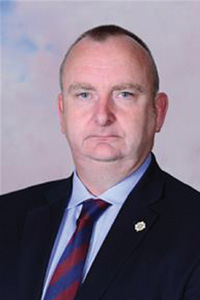 Alf Clempson, formerly Scots Guards. Ben Wallace’s
political agent and former Platoon Sergeant
Alf Clempson, formerly Scots Guards. Ben Wallace’s
political agent and former Platoon Sergeant
|
I asked Ben Wallace about those Guardsmen that stand out for him, those who made a particular impression on him and his career. His political agent in his constituency, and one of his local county councillors, Alf Clempson, was the first to come to mind, since he is someone who is now very much part of his life as a politician. Alf, a former Warrant Officer in the Scots Guards, and his old Platoon Sergeant in F Company, applies just ‘the same Sergeants’ Mess and Household Division discipline to his job’ now as he did then. Ben Wallace also remembers Willie Swinton, ‘a wonderful company commander …. one of those officers who had a charm and kindness, as well as being competent’ …. someone he really enjoyed working with. And Tim Spicer, a ‘disrupter’ (a quality that Ben Wallace recognises), and a good Commanding Officer who ‘took the fight to the enemy in Belfast’. And Garrison Sergeant Major Perry Mason, who Ben Wallace recalls from his time in London. ‘I still think of him when I see people with their hands in their pockets’ As Perry Mason would say ‘Sir, officers do not put hands on their hips or in their pockets!
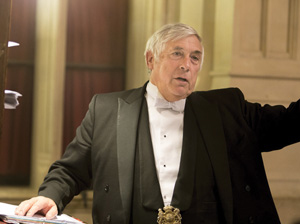 Keith Phipps, formerly Coldstream Guards, Ben Wallace’s Company Sergeant Major at Sandhurst, and formerly Principal Doorkeeper at the Houses of Lords Keith Phipps, formerly Coldstream Guards, Ben Wallace’s Company Sergeant Major at Sandhurst, and formerly Principal Doorkeeper at the Houses of Lords |
Another former Guardsman that Ben Wallace remembers well is Keith Phipps, a Coldstreamer and his Company Sergeant Major at Sandhurst, who retired in November 2019 as Principal Doorkeeper at the Houses of Lords. Ben Wallace would see him frequently at Westminster, and he was someone who helped to get him through Sandhurst and certainly influenced his decision to join the Guards.
It was very clear from our early morning conversation on VE Day 2020, with me in Wiltshire, and the Secretary of State in the Major General’s office, that Ben Wallace’s time in the Army and in particular the Household Division, has shaped his life in many ways, indeed, he says it was the making of him. It has given him enduring memories, both the valuable lessons he has learnt, and the people he served alongside, many of whom have remained close friends.
He summed it all up by recalling the Officers’ Messes as an eclectic mix of ‘thrusters, characters, dreamers, and drifters …. it was part of us, and in time of war you never know which is the one that pulls you out of trouble and is the great leader’. He hopes and believes that this is still the case, while acknowledging that the Army he remembers has changed in many ways, and if anything is even more professional than in his day.
In the ten months since Ben Wallace became Secretary of State for Defence, he has not yet had the opportunity to visit a Household Division Officers’ Mess. Hopefully, when we are through this Covid-19 situation, he will have a chance to do so, by which time the officers he meets will have been able to consider which of those four characteristics best describes them!
|
|

 The Secretary of State for Defence laying a wreath at the Guards’ Memorial at 6am on VE Day, Friday 8th May 2020
The Secretary of State for Defence laying a wreath at the Guards’ Memorial at 6am on VE Day, Friday 8th May 2020
 Ben Wallace meeting the United States Secretary of Defense Mark Esper at Horse Guards in September 2019
Ben Wallace meeting the United States Secretary of Defense Mark Esper at Horse Guards in September 2019  Ben Wallace in the House of Commons
Ben Wallace in the House of Commons
 Keith Phipps, formerly Coldstream Guards, Ben Wallace’s Company Sergeant Major at Sandhurst, and formerly Principal Doorkeeper at the Houses of Lords
Keith Phipps, formerly Coldstream Guards, Ben Wallace’s Company Sergeant Major at Sandhurst, and formerly Principal Doorkeeper at the Houses of Lords